CATEGORIES
Latest Stories
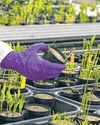
Bayer Projects Lower Earnings
Bayer guided for lower earnings this year as it continues to work through a turnaround plan, but said performance is expected to improve from 2026.

Road Cones Are the Real Hazard To New Zealand's Health
Proliferation is tearing the country apart; 'It's cone-mania down here'

Russia Chases Pact to Keep Bases in Syria
Moscow, which called rebels terrorists, aims to deal with them as the new government

North Korean Defector Hailed as 'Hero of Ukraine'
When Ukraine was scrambling this winter to understand how to respond to the threat of thousands of North Korean soldiers deployed to fight alongside Russia, it turned to someone steeped in Pyongyang's ways: a North Korean defector.

Critics of Musk's DOGE Role Get Opening
Trump's shout-out to billionaire ally aids lawyers contesting his authority at agency
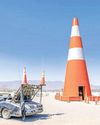
A Nation Divided Over Road Cones
\"It's cone-mania down here,\" said Mel Gold, the operations manager at Searchlight Brewery, which has sold a beer called Conestown Lager.

'Snakebit'—It's Been a Month From Hell for the Mavericks
THE INSTANT THE DALLAS Mavericks sent Luka Doncic away to the Los Angeles Lakers one month ago, the deal had a chance to go down as one of the worst NBA trades of all time.

McDonald's Gets a Tech Makeover
McDonald's is giving its 43,000 restaurants a technology makeover, starting with internet-connected kitchen equipment, artificial-intelligence-enabled drive-throughs and AI-powered tools for managers.

Starbucks Workers Told to Step Up
CEO says coffee chain's turnaround hinges on greater accountability

What Drove Michelangelo?
Born 550 years ago, the Renaissance master usually has his achievements ascribed to 'genius,' but there's more to it than that

Can New York Survive a Cuomo Comeback?
Andrew Cuomo picked a portentous day to launch his New York City mayoral campaign.

Venture Looks to Buy Rights to 15,000 Songs
Aquarian Holdings, an investment firm founded by ex-Guggenheim Partners executive Rudy Sahay, has formed a joint venture with asset-based financing specialist Raven Capital to acquire copyrights to less well-known musical works.

Target Aims to Bring Back the Magic
Retailer plans to improve private-label lineup and store experience, but a turnaround will take time

Modi Backs Trump Migrant Effort
During a visit to Washington in February, Indian Prime Minister Narendra Modi made one point crystal clear: He would gladly take back unauthorized Indian migrants from the U.S.

CEOs Face New Uncertainty On Front Lines of Tariff War
Shortly before midnight, tech executive Morten Wierod sent a WhatsApp message to a dozen top leaders at his company, letting them know that President Trump's long-awaited tariffs were becoming a reality.

As Nuclear Gains, Its Waste Piles Up
A nuclear power renaissance—driven in part by power-hungry AI data centers—has revived a thorny problem: what to do with the radioactive waste left behind.
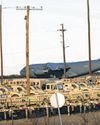
U.S. Shifts on Deportation Flights
Use of military planes is paused, with administration citing high costs

More Americans Rely on Their 401(k)s As a Rainy Day Fund
Financial emergencies are pushing more Americans to break into their 401(k) accounts.

Can Trump Get Pete Rose Into the Hall?
The president wants to see the disgraced baseball legend enshrined in Cooperstown. He could be close to getting his wish.

Trump's Deft Victory Dance
Full of grand notions and vitriol, his speech caught Democrats flatfooted Tuesday.
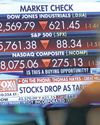
Investors' Worry Over Growth Brings 'Recession Trade' Back
Wall Street is having another growth scare.

China Is Secretly Worried Trump Will Win Showdown
In seeking accord with U.S., Beijing wants to avoid becoming isolated like the Soviet Union during the Cold War

Car Firms Receive A Month's Reprieve On Tariffs
Move follows request from Ford, GM and Stellantis; Trump is open to other tweaks

Fliers Worried About Safety Have Their Questions Answered
Flying is still the safest mode of transportation despite January's collision near Washington

Is Buying an eSIM for a Trip Abroad Worth the Hassle?
There's a steep learning curve, but once you figure it out, there can be significant savings

U.S. Intelligence Sharing With Ukraine Is Suspended
Move is expected to cripple Kyiv's ability to target Russian military forces

Toy Makers Fret Over Rising Costs and Price Hikes
Toy makers are worried, as everything from dolls to board games is about to get more expensive.

the L Ο N G G A M E
A new longevity business at Canyon Ranch, the famed wellness resort, invites stressed-out founders to spend $20,000 on life-extending treatments.
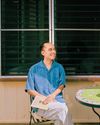
WE NEED TO TALK ABOUT KEVIN
HE DESIGNED THE INTERNET AS WE KNOW IT TODAY. SO WHY ISN'T HE IN THE PANTHEON OF SILICON VALLEY FOUNDERS?

Karen Dillon Does your company have too much conflict, or too little? Here's why healthy conflict is key to business success.
I've always prided myself on getting along with others. But a few years ago, one colleague got under my skin.
